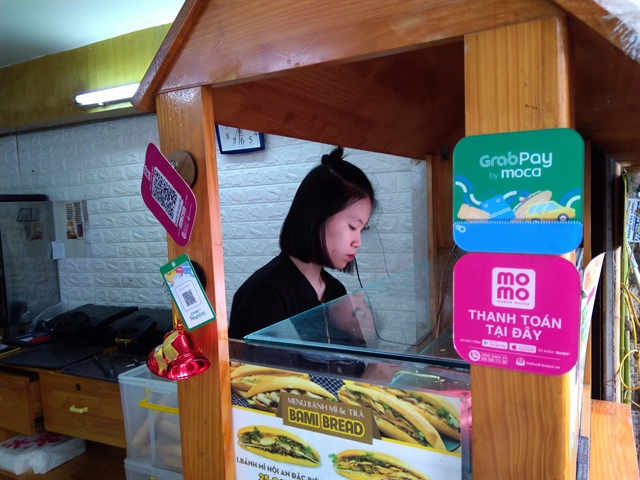Only about 40 per cent of Viet Nam's 95 million people have bank accounts, mostly in urban areas, while there are around 120 million mobile phone subscriptions

Telecommunications firms are ready to pilot a mobile money service thanks to their modern technology infrastructure, customers, wide transaction point networks and financial resources.
Prime Minister Nguyen Xuan Phuc has directed the Ministry of Information and Communications in co-ordination with the State Bank of Viet Nam to develop a mobile money project.
The scheme will permit telecommunications firms to pilot a mobile money service not linked to consumers’ bank accounts.
He noted that the mobile money service together with banks aimed to accelerate the development of e-payments in the country.
Minister of Information and Technology Nguyen Manh Hung in a meeting last week said digital technology would create new business models and challenges or replacing the old ones.
“Allowing mobile phone accounts to implement payment would promote non-cash payment to all people. However, this could be a challenge for banks. The issue is whether the Government would accept the new business model or not,” Hung added.
Responding to the move, telecoms providers have prepared to supply the services.
MobiFone is one of three firms to submit an application to the central bank to launch mobile money. It said mobile money allows customers to transfer money using mobile phones. The service therefore could serve people without bank accounts, especially those in remote and mountainous areas who lack opportunities to access financial services.
A representative from MobiFone said mobile money would support Viet Nam’s e-payment system and digital transformation, and be an important component for the Fourth Industrial revolution.
Earlier, VNPT Viet Nam Posts and Telecommunications Group (VNPT)
at its meeting with deputy PM Vuong Dinh Hue in February, asked for permission to launch a mobile money service. It confirmed it is ready to pilot the service.
Tran Manh Hung, VNPT’s chairman, said mobile money had been a common development trend globally.
VNPT had strength in science and technology, a wide telecoms network nationwide and a large number of mobile phone users, making it capable of developing a non-cash payment system.
“VNPT is ready in terms of capital, with enough charter capital to establish a bank,” Hung said.
Le Dang Dung, acting chairman of Viettel said the group also submitted a proposal to the Government to participate in developing digital payment.
“Mobile money contributes to developing non-cash payment in Viet Nam and better meets with the increasing demands of customers. It is suitable for people in rural and remote areas who have less access to traditional banking services,” he said.
Pham Trung Kien, Viettel Telecom’s deputy general director, said Viettel must develop different services to allow groceries, car parking and coffee shops accept payments through mobile phones.
Mobile money would be a big opportunity for telecom firms to have breakthrough development and fully exploit their transaction networks and science and technology foundation.
E-payment has been on the rise in Viet Nam in recent years. The Vietnamese fintech market is set to reach value of US$8 billion in 2020. Digital payment solutions account for 89 per cent of the fintech market in Viet Nam, while individual and business financial areas are also forecast to have growth rates of 31.2 per cent and 35.9 per cent respectively by 2025.
Governments across Southeast Asia are pushing ahead with efforts to create cashless economies, with less developed countries such as Viet Nam and Thailand leapfrogging richer ones like Singapore and Malaysia in electronic payments, Nikkei Asian Review reports.
Viet Nam and Thailand are experiencing a boom in mobile payments as more people use e-wallets to pay for goods and services without going through banks, it says.
Viet Nam has been promoting electronic payments since 2008. Only about 40 per cent of the country’s 95 million people have bank accounts, mostly in urban areas, while there are around 120 million mobile phone subscriptions.
Nikkei says local information technology and telecom companies, including VNPT, Viettel and FPT, have introduced e-wallets and encouraged people to put away their cash. But none had made much headway until recently.
Now things are taking off, with the number of people making mobile payments in stores growing faster in Viet Nam than elsewhere in Southeast Asia, according to a recent PwC report. The percentage of consumers in Viet Nam using mobile payments increased from 37 per cent in 2018 to 61 per cent in 2019.
"Mobile payment services also are gaining widespread acceptance, especially in emerging regions that have leapfrogged past landline-based telephone systems and gone straight to mobile and smartphones," the report says. — VNS





